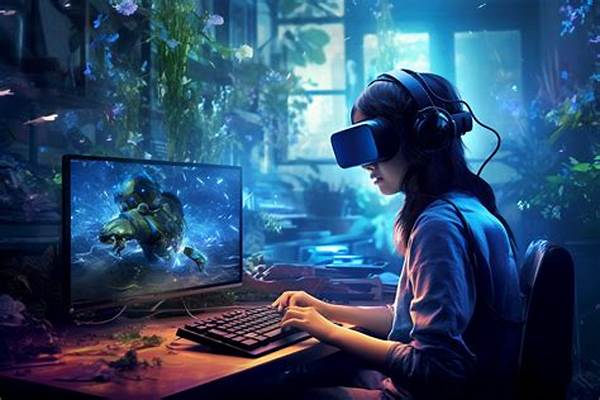Hey there, fellow gamers and tech enthusiasts! Have you ever wondered how games seem to know just how to challenge you or when to give you a break? It’s not magic – it’s adaptive artificial intelligence in games! This fascinating technology is reshaping the way we play by making our gaming experiences more personalized and dynamic. So, grab your favorite gaming snack, settle in, and let’s dive into the world of adaptive AI in gaming.
Read Now : Tropical Paradise Overwater Retreat
Understanding Adaptive AI in Gaming
Adaptive artificial intelligence in games is like having a virtual buddy that learns your playing style. Imagine playing a game where the AI isn’t stuck in a loop of predictable moves. Instead, it adjusts itself based on how you play, making the experience exciting and less monotonous. Adaptive AI in gaming can tweak the difficulty level or change strategies on the fly, creating a fresh challenge every time you play. This capability keeps players engaged, reduces frustration from repetitive patterns, and it’s like having a game that grows with you. By observing your actions, the AI cleverly analyzes and adapts its strategies to ensure the gameplay remains fun yet challenging. It’s evolution at its digital finest!
How Adaptive AI Transforms Gameplay
1. Personalized Experiences: Adaptive artificial intelligence in games tunes into your skill level and adjusts the game accordingly.
2. Dynamic Challenges: Games switch up tactics using adaptive AI, keeping you on your toes.
3. Real-Time Adaptation: It’s all about instant learning and response, thanks to advanced AI algorithms.
4. Reduced Predictability: With adaptive AI, you can say goodbye to boring, repetitive gameplay.
5. Enhanced Engagement: The evolving nature of adaptive AI keeps the gaming experience fresh and exciting.
The Evolution of AI in Games
Over the years, adaptive artificial intelligence in games has evolved from scripted behaviors to learning systems. In the days of yore, game AI was simple, following preset rules and offering limited interactivity. Today, however, AI has taken a giant leap forward. It now uses techniques like machine learning to understand player behavior and modify its actions in real-time. This new level of adaptability has taken gaming to heights we didn’t even imagine a decade ago. Adaptive AI analyzes your strategies, learns from your moves, and adjusts its approach to keep you engaged and challenged, making every game session unique.
Read Now : Family Summer Holiday Beachfront Resort
Challenges Implementing Adaptive AI in Gaming
Implementing adaptive artificial intelligence in games isn’t without its challenges. Balancing difficulty is a major hurdle. Developers must ensure that the AI doesn’t make the game too easy or frustratingly difficult. Technical limitations, such as processing power, can also pose issues. Additionally, determining how the AI should adapt without making gameplay unfair is a complex task. Ensuring the AI respects the player’s learning curve while maintaining engagement requires sophisticated algorithms. Developers must tread carefully to maintain the game’s fun factor without compromising on fairness or playability. Despite these challenges, the potential of adaptive AI in gaming is far too promising to ignore.
The Future of Gaming with AI
The future of adaptive artificial intelligence in games looks incredibly promising. Imagine games where NPCs (non-player characters) evolve their personalities based on interaction history, or missions that adapt based on player choices. We’re heading into an era where games could function as personalized narratives, shifting emphasis on story arcs depending on individual decisions. The integration of advanced AI can bring about a more engaging and immersive universe, catering to diverse gaming preferences. While we’re already seeing impressive developments, the possibilities for enhanced realism and personalization are seemingly endless, and the future of gaming will be shaped significantly by these advancements.
Benefits of Adaptive AI for Developers
For developers, adaptive artificial intelligence in games offers a treasure trove of benefits. Firstly, it allows for the creation of more engaging content that can adapt to various player styles, reducing the need for frequent updates or patches. This adaptability not only extends the longevity of a game but also fosters a loyal player base that appreciates the varied and personalized experience. Additionally, the dynamic nature of adaptive AI can streamline the development process, allowing developers to build frameworks that can evolve over time, reducing future workload. In essence, it empowers developers to create richer, more complex worlds with lasting appeal.
Conclusion: The Impact of Adaptive AI
Adaptive artificial intelligence in games is shaping the future of the gaming industry by offering dynamic and individualized experiences. As developers continue to harness this technology, games will become more responsive, engaging, and attuned to individual player preferences. The evolution of AI in gaming stands as a beacon, pointing to a future where games are not just played—they’re experienced uniquely by every player. Whether you’re a seasoned gamer or a casual player, adaptive AI promises a future where every gaming journey becomes a personal adventure, evolving as you do, and ensuring no two experiences are ever quite the same.



